What should I know before buying a used car?

Vlada Janković
When you are looking for a used car and intend to buy it, we reveal 4 questions to which we answer, in order to choose the best car that is in accordance with your needs:
1) What are my needs?
2) What is my budget?
- Shopping for cash
- Purchase on credit
3) How do I check the car?
- Mileage record and mileage manipulation
- Registry of stolen vehicles in Europe
- Checking accidents and car damage
- Safety recalls
- Market value of the vehicle
- Pictures of vehicles
4) I got the report, what now?
- Contact the seller
- Buying a vehicle from a private seller
- Buying a vehicle from a car dealer
- Car review
- Request a test drive
- Negotiate the price
- Sign the contract and pay for the vehicle
So let's start in order...
1) What are my needs?
The first thing you need to do when you plan to buy a used car is to define the category of vehicle you want to buy. Although there is a discrepancy between our wants and needs, it is good if you own one car, that it meets all your needs. Today, there is a large selection of different vehicle categories: small city car, compact car, sedan, station wagon, crossover, SUV, MiniVan and many others.
If you are single and use the car for city driving, traveling to work and short distances, a good choice is a small car or a compact car. For family people, the most common choices are limousines, station wagons or crossovers and SUVs. Business people will choose a limousine, an SUV or a sports car – a coupe or a convertible.
You can easily find information about different models on different portals or in specialized car magazines. Pay attention to the experiences of other vehicle owners, which are valuable, and be sure to check the maintenance costs.
Consider questions related to how much mileage you do per year, do you need 4 wheel drive, petrol, diesel, hybrid engine, how much luggage do I need, how many passengers do I carry. These are all questions that you need to answer, which relate to defining your needs for a used car.
2) What is my budget?
Needs and wants are one thing, but the money you have available to buy is something completely different. In addition to the price of the vehicle that you are willing to pay for the car, you need to take into account other costs of the purchase.
These costs include the costs of maintenance, minor and major repairs, notary, insurance, registration, contract, etc. So if you plan to pay 10,000 EUR for a car, you need to have 11,000 to 12,000 EUR to cover all the costs related to the purchase of a used vehicle.
Within your budget, you need to consider what financing options are available to you. Most often, these are cash or credit. Both options have their advantages and disadvantages.
Advantages of buying a vehicle for cash:
- better negotiating power regarding the price,
- lower price - discount,
- no installments or interest due to financial institutions,
- you can sell the car whenever you want.
Disadvantages of buying a car for cash:
- usually used for vehicles of lower value,
- reduction of savings,
- a loan is required for more expensive vehicles.
On the other hand, buying a car on credit is a much more widespread practice, especially for newer and higher value vehicles. Banks most often approve financing through car or consumer loans. Pay attention to the interest rates and compare the offers of different banks. Financing of used cars by banks has limitations in terms of time, own participation, interest, so be sure to check the conditions in order to find the most favorable offer.
Advantages of buying a vehicle on credit:
- you can buy a newer and more expensive model,
- tax deductions,
- you do not touch the savings,
- you pay in installments according to your income.
Disadvantages of buying a vehicle on credit:
- payment of interest,
- more expensive way of financing,
- you are tied to this vehicle longer.
Therefore, when choosing a car, it is necessary to balance budget and needs and find an adequate car in accordance with wishes, needs and the possibility of financing.
3) How do I check the car?
When you have found the car you intend to buy according to your budget, the next step is to check the car. In the past, the check was done by going to the dealer or taking your mechanic who would look and check the car in detail. Today, checking is also possible from the armchair.
All you need before going to the dealer is to ask for the vehicle's vehicle identification number (VIN number). Sometimes it is available immediately and in the ad you are viewing. The chassis number is a unique 17-character alphanumeric code that is unique to each vehicle. By entering the VIN number in the VINCheckExpert search engine, you will get basic information about the vehicle.
By creating a report you will get detailed information about any used car. This information relates to mileage records, stolen vehicle records, accident and damage records, safety recalls, services, vehicle value.
Mileage record and mileage manipulation
In addition to the history of mileage records, important information is whether there was any manipulation with the mileage. If there was a mileage refund, it will be indicated in the report. This information is important in order to avoid being deceived, so that you do not overpay the price and have expensive repairs.
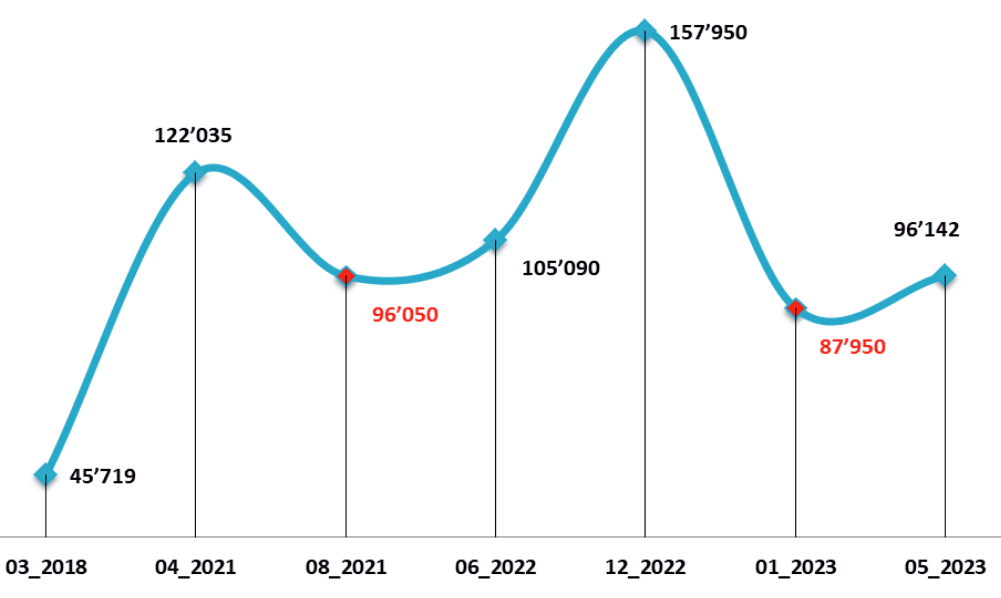
Register of stolen vehicles in Europe
Then, you will receive information from the database of stolen vehicles in Europe, whether that vehicle has been marked as stolen in a certain country. If this appears in the record, it is a clear signal that such a vehicle should be avoided for purchase. If everything is fine you can be carefree.
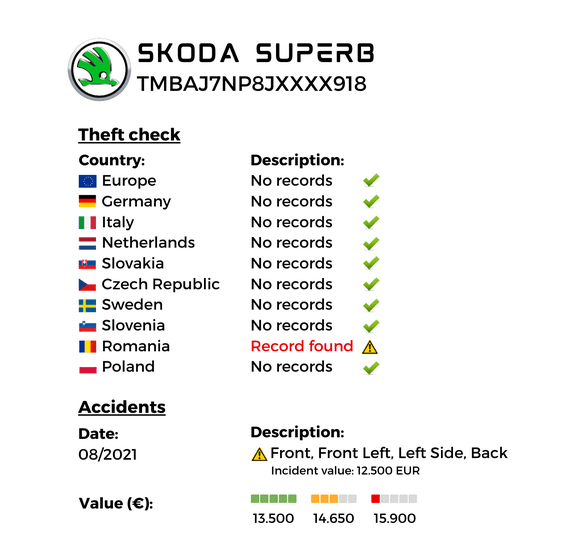
Checking accidents and car damage
You will receive information on whether the car had accidents and damages, when they occurred and the cost of repairs. The safety of the car depends on whether it has had accidents and damages and whether the car has been adequately repaired.
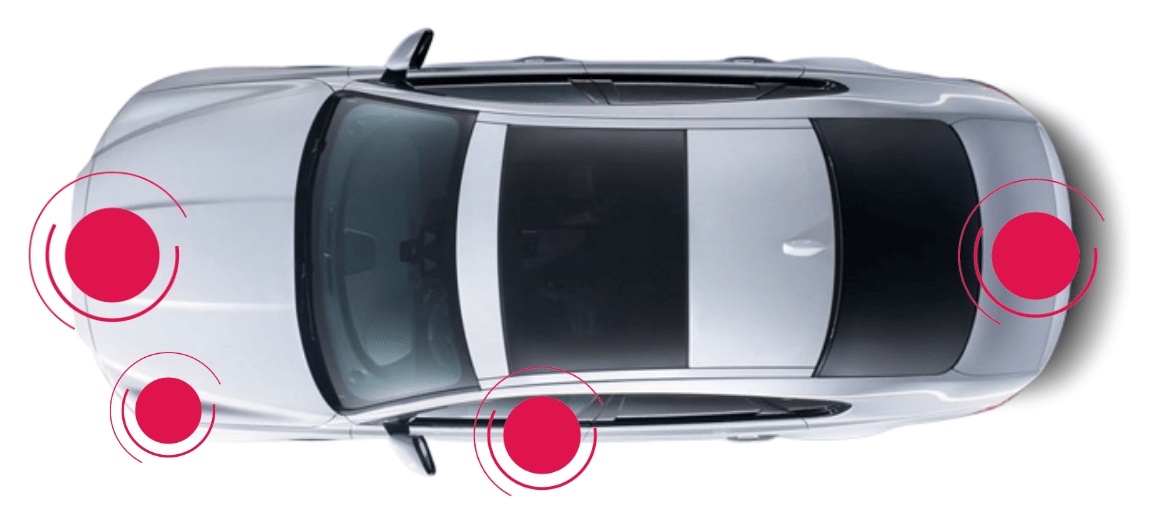
Safety recalls
If there have been vehicle recalls, or safety recalls, due to various manufacturing defects, this information will be displayed in the report.
Market value of the vehicle
A very important piece of information when buying a used car is the realistic market price you should pay. Within the report, you will receive information about the real, as well as the maximum and minimum price for each car model.
Pictures of the vehicle
At the end of the report you will receive historical photos of the vehicle. If the car had any damage, it will be clearly visible in these photos.
4) I got the report, what now?
If you have decided on a specific car based on the used car history report you have, you now need to contact the seller who can be a private seller or car dealer, inspect the car in detail, schedule a test drive, negotiate the price and sign the contract and pay for the vehicle purchase completed.
Contact the seller
Call the seller and ask in detail about the car you saw in the ad. This is a good way to find out if it is a private seller, why the car is being sold, if it has had accidents or any damage, and to find out details that are not written in the ad.
Experienced sellers will offer you a vehicle history report themselves, which is a good signal that they are not hiding anything. However, you can ask for the vehicle identification number during the conversation. If the seller does not want to give it to you or does not send it to you later, and he promised, be sure that he is hiding something, because he knows that every vehicle can be checked in detail based on the VIN number.
Buying a vehicle from a private seller
The advantage of buying a vehicle from a private seller is a lower price and lower costs. The private seller is motivated to sell his car as soon as possible, so he will significantly lower the price in order to sell the car as soon as possible. However, when you buy from a private seller you cannot get a car warranty. Most often, the car is bought in the condition it was seen, so all the costs of repairs or unforeseen breakdowns are borne by the buyer.
Buying a vehicle from a car dealer
The advantage of buying a used car from a car dealer is a much larger offer and choice of vehicle models. You can easily match your budget with the car dealer's offer. Sellers are obliged to give you a guarantee on the correctness and legality of the vehicle. Also, very often they check the vehicles themselves before buying.
The safest way to buy used vehicles is from authorized car dealerships that sell certified used vehicles. These are cars that have been thoroughly inspected, on which all defects have been removed, which are in good condition and have a preserved interior.
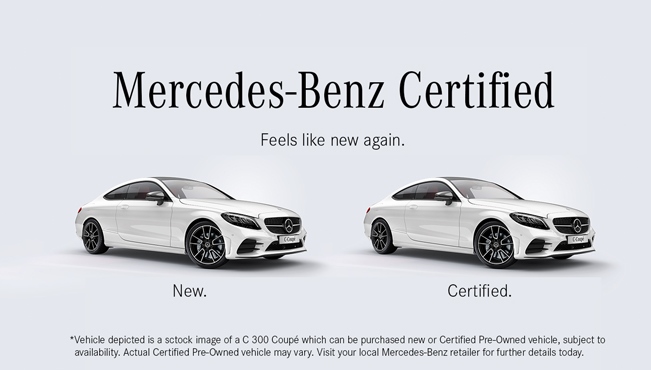
Having obtained the report, you now need to ask the seller for a test drive and inspect the car in detail.
Car review
At the beginning, check the bodywork, whether the space between the chassis panels is uniform, check the color, differences in color and gloss, check the tires and glass. If you're buying a car with a gasoline or diesel engine, check the engine, whether it's leaking oil, what the sound is like. Then check the interior of the vehicle and the overall condition of the interior in detail. Many scratches and defects are not visible in the pictures on the ad, they can only be noticed when you inspect the car in detail.
Ask for the service book, to check if the car has been regularly serviced and what has been done on the car. If the seller has invoices from the service, look at them in detail and check them.
If you want to buy an electric car, you first need to check the status of the battery, what is the range, whether it has been regularly serviced, what is the remaining charging capacity, charging history, whether it is still under warranty and replacement costs.
If you are not sure yourself, the best way to check is to take the car to a service center or take the mechanic with you.
Request a test drive
The test drive is the most important part of the used car buying process. This is a good way to get to know the car, test the performance, but also determine if there are any defects that you could not see with a simple inspection. Here are some quick tips for a test drive:
- The test drive is best organized during the day, in order to notice all the shortcomings.
- Listen to the sound of the body, the sound of the interior, pay attention to the turning on and off of all the lights on the instrument panel.
- Listen to the sound of the engine when it starts and give it a light gas several times.
- Try the steering wheel, clutch, brake. Make sure they work properly, that there is no resistance when stepping on and releasing.
- Check if the vehicle does not turn left or right on the right road, if the steering wheel does not squeak when you turn.
- Listen to the sound in the vehicle when you go over potholes, whether there is any unpleasant knocking and metal-to-metal knocks, which may indicate problems with the transmission.
- Try driving on the highway, how the car accelerates and brakes suddenly.
Negotiate the price
Very often, sellers state in the ads whether the price is fixed and do not leave the possibility of negotiation or the price by agreement, which can still be adjusted. Practice shows that sellers are always ready to lower the price because they want to sell the car, and they know that there are many more of the same or similar models on the market.
A good way to start a price negotiation is to point out any perceived flaws you've noticed. Every flaw you notice on the car is good for you, because it increases your chances of getting a price reduction. Also, it is good to have saved several competitive offers of the same or similar vehicles from the ad, which can help you estimate the price and negotiate with the seller.
In order to improve his position, and if he sees that you are interested in the car, the seller will use an old trick where he will tell you "I already have some people interested in this car" or "Now the next customer is coming after you, what should I tell him". It is important not to fall for these tricks and stay focused.
If there is good will, the price is formed in the middle of the original selling price given by the seller and the original offer given by the buyer.
Sign the contract and pay for the vehicle
When you agree on the price with the seller, you need to sign the contract. A car license containing all vehicle data and personal documents of the seller and buyer is required.
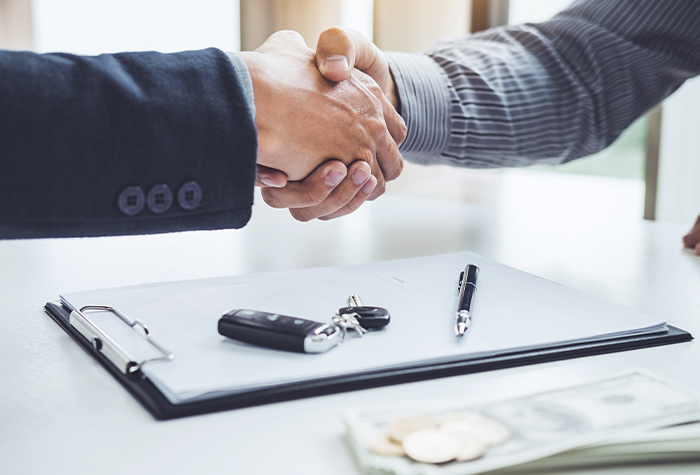
When buying from a private person, you will not receive an invoice, but the price will be indicated in the contract. By buying from a car dealer, they are obliged to issue you an invoice. The invoice does not automatically mean the transfer of ownership of the vehicle from the seller to the buyer, but it needs to be done with the competent authorities. By paying the agreed price, you become the proud owner of your "new-used" car.
How to create a used vehicle history report by chassis number (VIN)?
All you need to do is enter the 17-digit VIN number in the "Enter VIN" field and click the Search button. After a few seconds, VIN Decoder will provide a free VIN check and some basic information. This info should be enough to check whether the VIN is valid or not.
To create a complete report about the vehicle, such as mileage records, odometer fraud, estimate mileage, accidents and damages, theft check, market value, and previous images, you should download a VinCheckExpert vehicle history report.

Look at the following texts:
Check VIN number and car history here!
100% money back guaranteed! 

